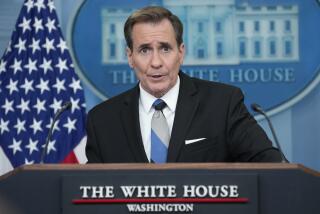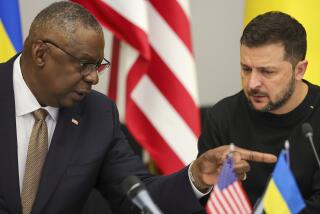White House Cautions That Strikes Remain a Possibility : Reaction: Officials say more shelling of Sarajevo--or discovery of more guns--could spur NATO action.
- Share via
WASHINGTON — The White House said Sunday that Bosnian Serbs had essentially complied with NATO’s ultimatum to lift the siege of Sarajevo and that no allied air strikes are necessary “at this time.”
But senior officials reiterated Clinton’s warning from earlier in the day that “the deadline still stands,” with the threat of NATO air strikes remaining open-ended if the shelling of Sarajevo is resumed, or if any weapons are found within the exclusion zone that the North Atlantic Treaty Organization has established within a 12-mile radius of the besieged and battered Bosnian capital.
“This decision stands. In the future, any weapons that are found in the exclusion zone will be subject to NATO air attacks,” National Security Adviser Anthony Lake said.
Shortly after the deadline of 1 a.m. today Sarajevo time (4 p.m. Sunday Pacific time) for Serbian compliance had passed, Clinton received word from NATO Secretary General Manfred Woerner that all but a handful of the Serbian guns surrounding the Bosnian capital had either been withdrawn or surrendered to U.N. control.
The “small handful” of Serbian weapons not under U.N. control as the deadline passed--said to number no more than nine artillery sites--were expected to be surrendered within hours, White House officials said, adding that snowbound roads and “abysmal” weather conditions had delayed the arrival of U.N. forces at those sites.
“All known heavy weapons have either been withdrawn from the exclusion zone (around Sarajevo), are under the control of the United Nations or soon should be,” Lake told reporters shortly after Clinton had conferred with Woerner.
“Therefore,” he added, “the U.N. and NATO commanders have concluded that no air strikes are necessary at this time.”
After a weekend of steadily mounting tensions, Defense Secretary William J. Perry and other senior officials monitoring preparations for the air strikes from a NATO base in Italy informed Clinton that the Serbs were finally “making serious efforts” to comply with the ultimatum issued by the allies after a mortar shell killed 68 people in a Sarajevo marketplace Feb. 5.
The officials said that as the deadline neared, Clinton conferred with Russian President Boris N. Yeltsin for more than 20 minutes by telephone and thanked him for Russia’s role in helping to persuade the Serbs to lift the siege of Sarajevo.
But claiming credit for the first tangible success of a policy that has floundered for most of the past year--with Clinton under mounting criticism from Democrats and Republicans for ignoring the Bosnian crisis--Administration officials also insisted that it was the allies’ resolve that ultimately forced the Serbs to comply with the Western demands.
U.N. officials in Sarajevo had for several days been confidently predicting that the Serbs would comply with the ultimatum, but U.S. officials remained far more cautious--even skeptical--in their assessments until the end.
On Sunday, however, as reports coming into the White House described what U.S. officials called a “hectic” Serbian effort to comply with the ultimatum, the pessimism dissolved into more optimistic assessments, and by early evening the mood at the White House was decidedly upbeat.
Lake said the Serbs surrendered about 150 heavy weapons at 13 U.N. collection points Sunday, bringing the total number of Serbian guns under U.N. control at the collection sites to 250. The more lightly armed Bosnian government forces had turned in about 50 heavy weapons, he added.
As the deadline passed, that left only nine known Serbian artillery sites in the exclusion zone that U.N. troops had yet to control, Lake said. At least four of them were expected to be under U.N. guard by this morning, while the other five remained inaccessible because of heavy snows.
Clinton himself gave some indication of the progress earlier in the day, when he told reporters he was encouraged by signs that the Serbs were finally complying with the ultimatum.
“The Serbs seem to be moving weapons, and also bringing U.N. forces to the weapons that cannot be moved. So that much is encouraging,” Clinton said after attending a church service in Washington.
While Clinton said the Serbs had “plainly” not moved or surrendered all of their weapons around Sarajevo, he indicated that the heavy snows should be taken into account.
More to Read
Get the L.A. Times Politics newsletter
Deeply reported insights into legislation, politics and policy from Sacramento, Washington and beyond. In your inbox twice per week.
You may occasionally receive promotional content from the Los Angeles Times.








